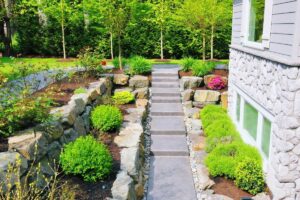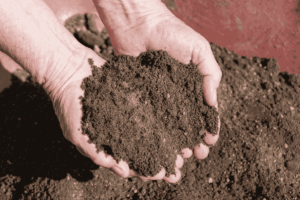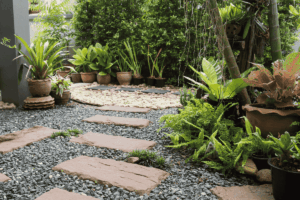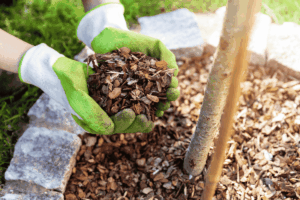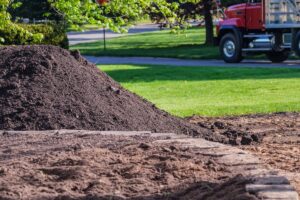As winter approaches, it is important to prepare your garden to bloom beautifully in spring. Applying bark mulch is one of the best ways to protect your garden in Bonney Lake, Eatonville, Gig Harbor, Steilacoom, and surrounding WA communities during the cold months. This simple yet effective gardening practice offers many benefits that help your plants survive the chill and emerge healthier in the spring. Let’s discuss why mulching before winter is important, the benefits of bark mulch, and how to apply it for optimal protection.
The Importance of Mulching in Winter: Protecting Your Garden with Bark Mulch
Mulching is the process of covering the soil with organic or inorganic materials to retain moisture, regulate temperature, and suppress weeds. The process is done throughout the year but is particularly important during winter. During this season, mulch insulates the roots of plants, saves moisture, and protects from temperature fluctuations. Bark mulch is one of the most popular mulches because of its aesthetic appeal and effectiveness in winterizing gardens.
Whether you’re in Tacoma, Graham, Puyallup, and nearby WA locations or the surrounding areas, bark mulch can help ensure your garden is ready to face the winter months.
Why Mulching Before Winter is Essential?
According to the most credible bark mulch specialists in Port Orchard, WA, winter weather can be quite harsh on gardens, especially when temperatures drop and the ground freezes.
Mulching before the cold sets in is important for several reasons:
Moisture Retention:
During the winter, air can be dry, and soil can lose moisture rapidly. Bark mulch helps hold moisture by keeping it from evaporating, ensuring your plants have access to necessary water throughout the season. This is a particular benefit to areas like Tacoma and Puyallup that have dryness in the winters, stressing out plants.
Temperature Regulation:
Bark mulch acts as a natural insulator, helping to keep the soil at a stable temperature. Leading bark mulch specialists in Steilacoom, WA, this prevents freezing and thawing that can harm plant roots. A thick layer of bark mulch ensures that the roots stay insulated and protected.
Soil Erosion Prevention:
Rain and melting snow can wash away soil, taking valuable nutrients with it. Bark mulch helps prevent erosion by stabilizing the soil and protecting the garden bed from harsh weather.
Weed Suppression:
Top bark mulch experts in Bonney Lake, WA, reveal that weeds can still grow during warm winter spells. Bark mulch blocks sunlight and prevents weeds from sprouting, saving you time and effort when spring arrives.
Benefits of Using Bark Mulch for Winter Preparation
Beyond protecting your garden during winter, bark mulch offers many other advantages. Some of the most important benefits are as follows:
Slow Decomposition:
Bark mulch decomposes slowly, giving it long-lasting coverage and enriching the soil with organic matter. According to the most credible bark mulch specialists in Puyallup, WA, this helps improve soil structure and nutrient content over time.
Natural Pest Control:
Some types of bark mulch, like cedar and pine, have oils that naturally repel pests. This is one of the best ways to keep your garden pest-free during the cold seasons.
Aesthetic Appeal:
Bark mulch gives your garden a clean, polished look with a finished appearance that enhances the outdoor space. Its rich color complements most plants, making bark mulching suitable for ornamental beds, paths, or tree bases in places like Steilacoom, Port Orchard, and neighboring locations.
Eco-Friendly:
Made from sustainable materials, bark mulch is an environmentally friendly option that reduces waste. Many types of bark mulch are sourced from local mills, supporting sustainability and helping reduce your garden’s environmental impact.
Call us to discuss how we can help you with your projects.
How to Apply Bark Mulch for Winter Protection?
To ensure effectiveness, apply mulch correctly. Follow these simple application procedures:
Timing:
Apply mulch after the first frost and before freezing. In areas like Graham or Tacoma, bark mulching can typically happen in late fall.
Preparation:
Remove dead plants, leaves, or weeds from the garden bed prior to mulching. This will prevent the possibility of diseases and pests in your garden.
Layering:
Most bark mulch experts in Lakewood, WA, reveal that a 2 to 4-inch layer of mulch should be applied. Insufficient mulching may not ensure the insulation it provides. If it’s over-applied, the plant roots get strangled.
Distance from Plant Stems:
Space it several inches from plant stems and trunks, away from where it could rot. Drape the mulch in a layer over the area.
Maintenance:
According to the most credible bark mulch specialists in Eatonville, WA, the mulch layer should be monitored at intervals during winter and replenished as necessary to maintain adequate coverage.
Choosing the Right Bark Mulch for Your Garden
When selecting bark mulch, consider the following options based on your garden’s needs:
Shredded Bark:
According to the most credible bark mulch experts in Eatonville, WA, this is the best mulch for sloping areas since it reduces runoff and erosion. It also decomposes faster, enriching the soil faster.
Bark Chips or Nuggets:
These larger pieces of mulch decompose slowly and are great for long-lasting coverage. Use them in garden beds, along paths, or as decorative features.
Cedar Bark:
Top bark mulch specialists in Puyallup, WA, reveal that cedar bark is known for its insect-repelling properties, making it perfect for keeping pests at bay during the winter months.
Pine Bark:
Pine bark is an excellent choice for acid-loving plants like azaleas and blueberries. It’s slow to decompose and helps retain moisture in the soil.
Call us to discuss how we can help you with your projects.
Common Mistakes to Avoid When Mulching for Winter
Mulching isn’t all that hard. However, most people make one of the common errors listed below and let their gardens starve or suffer over winter.
Over-Mulching:
According to the leading bark mulch experts in Bonney Lake, WA, applying too much mulch can suffocate plant roots and promote fungal growth. Stick to a 2—to 4-inch layer.
Mulching Too Early:
Applying mulch too soon can attract pests and rodents. Wait until the ground has cooled before laying down the mulch.
Using Fresh Wood Chips:
Top bark mulch specialists in Port Orchard, WA, reveal that fresh wood chips can deprive the soil of nitrogen, therefore harming the plants. Use the aged bark mulch instead.
Neglecting Maintenance:
Mulch may shift or break down during the winter, so be sure to check the mulch layer periodically and refresh it if necessary.
Final Thoughts
Bark mulch is a great resource that will be needed to prepare your garden for winter. It will help insulate plant roots, retain moisture, prevent erosion, and keep weeds under control—in other words, your garden stays healthy all winter. Whether you reside in Bonney Lake, Lakewood, Tacoma, Eatonville, Gig Harbor, Port Orchard, Puyallup, Steilacoom, Graham, and neighboring areas, Randles Sand and Gravel offers a wide selection of high-quality bark mulch to help winterize your garden effectively. Visit us today to explore our mulch options and receive expert advice on which product is right for your garden’s needs. With the right mulch and proper application, your garden will be well-prepared to face winter and thrive in the spring.
For all your mulching needs, trust Randles Sand and Gravel to provide top-quality products and services. Contact us today at (253) 531-6800 to learn more!

